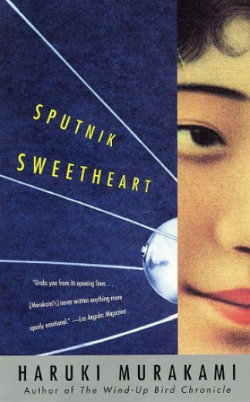 I’m generally a wee bit reluctant to reread books by Haruki Murakami because I don’t always like them as much the second time around. The problem is that I’ve read all of his novels published in English, so I’m kind of out of new material. After the terror of Bird Box, I wanted to read something more calm (and short because, you know, puppy), and, for whatever reason, I gravitated toward Sputnik Sweetheart. According to Goodreads, I read it in July of 2007, almost 7 years ago. I’d forgotten most of it with the exception of one scene involving a woman getting stuck on a Ferris wheel. It’s funny how one scene can stick in your head while you forget the rest of the novel, no matter how good it is. For a long time, I remembered White Noise ending when they reached the Red Cross shelter, and that’s maybe halfway through the book. I had forgotten so much. (White Noise is another book that deserves a rereading soon, but that’s another post.) Of course, I read Sputnik Sweetheart well before I started this blog, so I don’t have a previous review to look over.
I’m generally a wee bit reluctant to reread books by Haruki Murakami because I don’t always like them as much the second time around. The problem is that I’ve read all of his novels published in English, so I’m kind of out of new material. After the terror of Bird Box, I wanted to read something more calm (and short because, you know, puppy), and, for whatever reason, I gravitated toward Sputnik Sweetheart. According to Goodreads, I read it in July of 2007, almost 7 years ago. I’d forgotten most of it with the exception of one scene involving a woman getting stuck on a Ferris wheel. It’s funny how one scene can stick in your head while you forget the rest of the novel, no matter how good it is. For a long time, I remembered White Noise ending when they reached the Red Cross shelter, and that’s maybe halfway through the book. I had forgotten so much. (White Noise is another book that deserves a rereading soon, but that’s another post.) Of course, I read Sputnik Sweetheart well before I started this blog, so I don’t have a previous review to look over.
So. Sputnik Sweetheart is a pretty run-of-the-mill Murakami novel. There are multiple worlds/planes of existence/whatever you want to call them, and, of course, cats and wells. Not many of the latter two, but they’re there.
This one is about Sumire, a 22-year-old girl who quit college to write novels, though she hasn’t actually written one yet. She is good friends with the unnamed narrator, who is in love with her. She falls in love with an older woman, Miu, and becomes infatuated. There’s some trace of similar feelings on Miu’s end, but something happened to Miu when she was younger, and she says half of her is gone. Any kind of desire has left, along with her ability to play piano (her first vocation), and her hair turned completely white. Miu, who runs a family company, asks Sumire to work for her, and Sumire jumps at the chance. They eventually end up traveling together to a Greek island, and Sumire disappears. The narrator travels to the island to meet Miu and find out what happened.
Sputnik Sweetheart is one of the relatively rare novels that I liked more the second time around. Part of that is because of the length of time between readings – this time, I felt like I was rediscovering something I’d had but lost. I’d forgotten most of the story line: the Ferris Wheel scene isn’t even very long. Maybe being a little older and more settled helped, too. I can identify with the characters, and I think that I better understand what is going on and why. Which makes me realize how much I’ve changed in seven years – and how much happier I am for it.
So. Is this Murakami’s best novel? Probably not. I think the crown still belongs to The Wind-Up Bird Chronicle. Others might claim Norwegian Wood because it’s more accessible. Sputnik Sweetheart might be a great Murakami starter novel if you don’t get hung up on the gender of Sumire’s love interest because that part seems irrelevant here. Murakami isn’t especially controversial, and this shouldn’t be, either. It’s about being lonely and wanting love and willingness to cross worlds to get it. It really is a good novel, and now that I understand it better, it’s in my top five Murakamis.
In Puppy News, Zelda is 10 weeks old!
https://www.flickr.com/photos/lindsayloveshermac/14206131598/
She’s also crazy. Our candy bowl must be evil:
https://www.youtube.com/watch?v=oqshi5NCgpA
But how could you possibly stay annoyed with this puppy?
https://www.flickr.com/photos/lindsayloveshermac/14384879282/
Okay, I have an answer for that: these two kittehs, who are united in puppy annoyance.
https://www.flickr.com/photos/lindsayloveshermac/14199780628/
Who could blame them? Puppy sees kitteh, puppy wants to play. Chase chase chase, bite bite bite. Instead of fighting back, the kittehs run away. If they’re in a tight spot, the worst they’ll do is hiss and bat with their claws in. I’m beginning to think they should be a little more heavy-handed with Zelda.